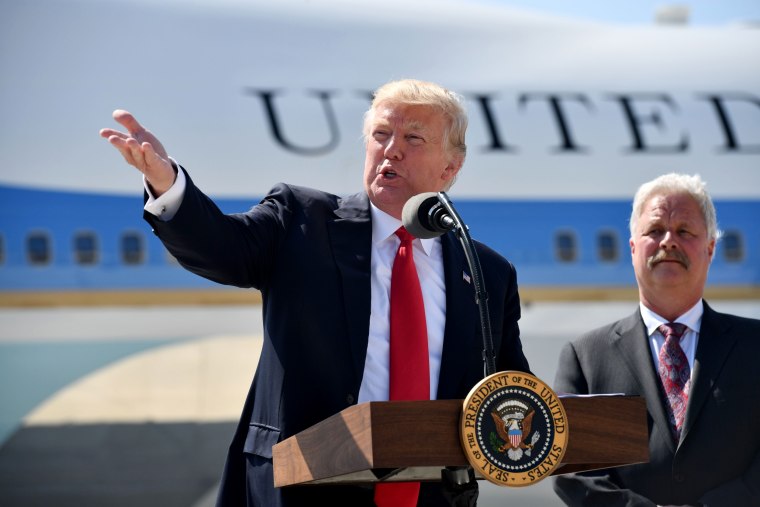Russia officially hung up on the United States on Monday, suspending the "hotline" between Moscow and Washington a day after the U.S. military shot down a Syrian air force jet. It was the latest signal of deteriorating relations between the superpowers, following the zigzagging path of U.S. foreign policy under President Donald Trump.
The dispute stems from the United States' support for Syrian President Bashar Assad's opponents — a relatively new policy that Trump enunciated after having spent a year on the campaign trail repeatedly inveighing against intervening in Syria.
The disagreement is in keeping with numerous reversals by Trump, which seem to have made life difficult for Secretary of State Rex Tillerson and U.S. diplomats.
On the campaign trail, for example, Trump repeatedly inveighed against intervening in Syria, where Assad's regime has used banned chemical weapons on its own citizens. In his October debate against Hillary Clinton, Trump went so far as to suggest aligning the United States with Syria against ISIS — disagreeing with his own running mate, Mike Pence. But then, on April 7, U.S. carriers fired 59 Tomahawk cruise missiles at Syria in response to another alleged chemical weapons attack by Assad's regime, which killed more than 100 people.
"I don’t think we've seen a Trump strategy develop," Nicholas Burns, the former undersecretary of state for political affairs under President George W. Bush, told Andrea Mitchell of NBC News in a recent interview. "There was the one airstrike on the airbase outside of Damascus after the chemical weapons attack. But other than that, you haven’t seen the president explain to the American people what is at stake."
Earlier this month, following moves by Bahrain, the United Arab Emirates, Egypt and Saudi Arabia to break diplomatic relations with Qatar, Trump accused Qatar of being a "funder of terrorism at a very high level," urging the nation's leader to "stop teaching people to kill other people" and to "stop filling their heads with hate."
But by last Wednesday, the United States agreed to sell Qatar $12 billion worth of fighter jets, a deal that a State Department official told NBC News was "a prime example of our enduring commitment to regional stability."
Such quick shifts are widely believed to have contributed to some remarkable public comments last month by Dana Shell Smith, then the U.S. ambassador to Qatar. Smith tweeted on May 10 that it was "increasingly difficult to wake up overseas to news from home, knowing I will spend today explaining our democracy and institutions."
Smith — who, as a career diplomat, not a political appointee, is traditionally supposed to be nonpartisan — ended her three-year term as ambassador on May 31.
Other examples of inconsistencies in foreign policy:
- After having derided NATO as "obsolete" during the presidential campaign and complaining that some members don't pay their fair share, the president in April declared that the alliance "is no longer obsolete." He even called it a "bulwark of international peace and security."
- Trump campaigned strongly against the North American Free Trade Agreement, threatening to withdraw the United States from the U.S.-Canada-Mexico deal. In mid-April, Trump told The Associated Press: "I think NAFTA has been a catastrophic trade deal for the United States." Then, less than a week later, the administration announced that the United States not only would remain in NAFTA but would even seek to update the agreement to "make all three countries stronger and better."
- During the campaign, Trump wrote an op-ed for The Wall Street Journal accusing China of "raping our country" by manipulating its currency. In early April, he called China the "world champion" of currency manipulators. But just 10 days later, he told the Journal never mind — "they're not currency manipulators."
The whiplashes have complicated matters for Tillerson, the man in charge of defining and explaining U.S. foreign policy.
While "I will never compromise my own values," Tillerson said last month on NBC's "Meet the Press," "I am devoted to helping the president achieve his objectives, helping him be successful."
Even as Trump appears to make policy on the spur of the moment — and then to announce it to the world on Twitter — Tillerson reassured Americans: "I understand what his objectives are.
"When I'm not clear on what his objectives are, we talk about it," he said.

